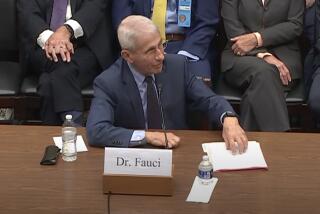Medicare Secrecy Is Called Unethical
- Share via
WASHINGTON — Richard S. Foster, Medicare’s top financial analyst, said Wednesday that he considered it “inappropriate and, in fact, unethical” for his boss to have ordered him to withhold information from lawmakers as they debated the Medicare prescription drug bill last year.
“I felt a very strong responsibility to the general public not to withhold technical information that could be helpful,” Foster told the House Ways and Means Committee. But the numbers were withheld from Congress after Thomas A. Scully, then the Medicare administrator, reportedly threatened to fire Foster if he shared them.
Foster, who said he “wasn’t afraid of getting fired,” planned instead to resign in protest until his staff talked him out of it.
Committee Democrats tried to use the hearing to illustrate what they called a cover-up that raised questions about the Bush administration’s credibility.
But Republicans, who sought to undercut the validity of Foster’s estimates, said Congress was legally bound to use the analysis of the Congressional Budget Office, which consistently produced a much lower estimate of the Medicare bill’s cost. In addition, they said, a 1997 law specifically gave Scully the authority to control the flow of information from Foster’s office.
“You may not like it,” Rep. Nancy L. Johnson (R-Conn.) told Foster, “but that’s the law.”
Wednesday’s hearing provided little new information about whether top administration officials were involved in the decision to withhold Foster’s estimates from Congress. But it gave Foster and Democratic lawmakers a dramatic public forum in which to press their case that the information hidden by the administration could have influenced the outcome of legislation that affects 41 million elderly and disabled Americans.
“You would not have had the votes to pass this bill if the true cost was known,” said Rep. Charles B. Rangel (D-N.Y.).
Foster said he believed that Doug Badger, the White House senior health policy advisor, and two other administration officials had learned in June that his estimates were significantly higher than the $400-billion ceiling for the bill set by President Bush. But Foster said he did not know when Health and Human Services Secretary Tommy G. Thompson had learned of his $500-billion to $600-billion estimates, and could not remember Badger or other administration officials directly preventing him from answering questions about his analysis.
In the Senate, meanwhile, four Democrats pressed their argument that Scully’s stifling of Foster was illegal. In a letter to Atty. Gen. John Ashcroft, the senators said that officials at the White House and two federal agencies might have violated “at least two” federal criminal laws.
Thompson has ordered an internal investigation of the matter, and several Democratic lawmakers have called for a probe by the General Accounting Office, Congress’ investigative arm.
The administration, which is bound to use its actuary’s estimates to project Medicare’s long-term financial outlook, announced in January that the Medicare reform law could cost $534 billion over 10 years, one-third more than the CBO’s $395-billion estimate.
In response to the prosecutorial questioning style of lawmakers from both parties, Foster said Wednesday that his office’s estimate of the final bill, as passed and signed into law, was not complete until Dec. 23. But top administration officials had known for several months of his higher cost estimates, he said.
Several Democratic and Republican lawmakers said they had realized that Foster’s estimate was based on different assumptions from those of the Congressional Budget Office. But Democrats said Wednesday that they did not know what effect Foster’s projections about seniors’ participation in certain Medicare programs would have on the cost of the bill.
Republican committee members ridiculed Foster’s assumptions and faulted both his office and the CBO for failing to consider the financial effect of the bill’s establishment of disease-management programs and a “welcome to Medicare” physical for new beneficiaries.
“I am just astounded that you could cost out every dollar that we spent but you couldn’t cost in money that we saved,” Johnson told Foster and CBO Director Douglas Holtz-Eakin.
Holtz-Eakin, Treasury Secretary John W. Snow and Stephen C. Goss, chief actuary of the Social Security Administration, also testified at the hearing, which was called to discuss Tuesday’s reports on the future of the Medicare and Social Security trust funds.
While some Republican members used their time to call for the privatization of Social Security, the Democrats focused the hearing on the issue of what Rep. John S. Tanner (D-Tenn.) called the administration’s “willful, deliberate and sinister withholding” of information.
Unlike some of his colleagues, committee Chairman Bill Thomas (R-Bakersfield) did not defend Scully’s stifling of Foster. Instead, Thomas encouraged Foster to confirm that he had offered the actuary his moral support when the Scully-Foster dispute first erupted in June.
“I said I would defend you in presenting your professional opinion,” Thomas said after Foster recounted their conversation. To underscore his support for Foster’s independence, Thomas recalled a similar conversation he had with the actuary in 1997, “when there was an administration of a different party.”
Ultimately, he said, lawmakers felt so strong about the Medicare actuary’s independence that they added a provision to the 1997 Balanced Budget Act to ensure that the actuary would report directly to the Medicare administrator.
More to Read
Get the L.A. Times Politics newsletter
Deeply reported insights into legislation, politics and policy from Sacramento, Washington and beyond. In your inbox twice per week.
You may occasionally receive promotional content from the Los Angeles Times.










